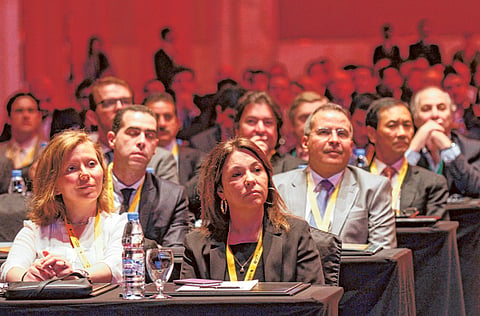Al Khaleej Sugar to defend position with lower margins
Company’s managing director plans to fend off growing competition with lower margins

Dubai: Al Khaleej Sugar will look to maintain their dominant regional position with lower margins in 2014 as growing competition and a fourth year of global sugar surplus bites at their market share.
“There are two new players coming onto the market one is in Bahrain and one is in Yemen. These are going to add to the competition. So we have to try to defend our position,” Jamal Al Ghurair, managing director, said on Sunday.
Al Ghurair was speaking on the sidelines of the 10th annual Dubai Sugar Conference, which is expected to see around 650 industry players from 45 countries participating over the four days.
Al Khaleej Sugar maintains a 60 per cent market share in the Gulf Cooperation Council (GCC) countries, Al Ghurair said, and exports 1.2 million tonnes of its 1.5 million tonne production.
But with production once again outweighing consumption in 2014, prices of the highly traded commodity continue to fall. Globally, production will outweigh consumption by 5 million metric tonnes in the 2013-2014 season that started last October, according to industry players speaking at the conference on Sunday
Al Ghurair said he currently pays $400 (Dh1,468) a tonne, compared to the $600 a tonne he paid last year.
“We are a value adder. We are a sugar refiner; we transfer the price. The raw material goes down, our selling price goes down. Our raw price sugar goes up, our selling price goes up. So we are a transformer,” he said.
Al Khaleej Sugar is looking to grow in international markets.
World market
“We’re saying that there is demand. We’re trying to grow market share in the short term in the domestic market, and we’re trying to get into the world market,” Al Ghurair said.
Al Ghurair would not say which markets Al Khaleej Sugar is looking at but ruled out Europe because of its restrictive regulation.
Most of Europe’s sugar imports are controlled by Tariff-Rate Quotas (TRQs), which sets the amount of sugar that can enter Europe at a reduced or zero tariff.
“It depends on … [the] policies of governments in different countries. Whenever they change their policies it becomes an opportunity or no opportunities. The sugar market in the world is controlled by different governments … It’s about what they will allow you to do,” he said.
Al Khaleej Sugar is currently able to produce up to 2.5 million metric tonnes of sugar a year under its existing capacity infrastructure.



